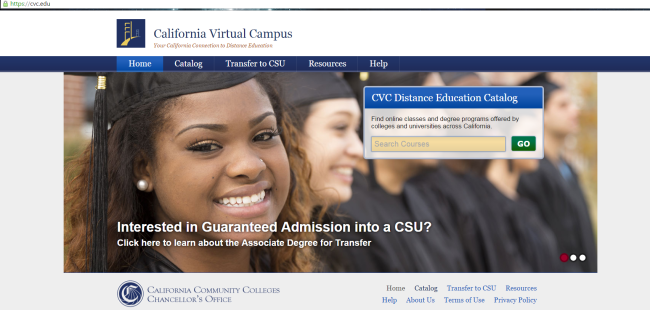You have /5 articles left.
Sign up for a free account or log in.

California Virtual Campus website
cvc.edu
California has one of the largest community college systems in the country, and its four-year universities are so challenged for space that they need many students to start at community colleges.
So for the past couple of years, the community college system administrators have been working to improve its online offerings. Officials announced Monday that they have revamped the system's California Virtual Campus website and made it easier for students to find transferable courses. The upgrades to the web-based online course catalog will make it easier for students pursuing an associate degree for transfer. That degree is part of a streamlined guaranteed transfer program with California State University campuses.
"The exciting upgrades we've made to the catalog will allow students to clearly and quickly see what classes fulfill transfer program requirements and serve to improve pathways to CSU, which is a significant step in our drive to foster student success through improved online education," said Brice Harris, chancellor of the community college system.
The revamped website is part of an initial $16 million investment from the state, and an additional $10 million per year will be available over the next four years, he said.
The upgraded website now makes the courses needed as part of the transfer pathway more prominent during searches. Students can narrow what they're looking for by geographic location, subject or institutional segment, said Steve Klein, program director for California Community Colleges Online Education Initiative.
By making the courses easier to find, the hope is that students will be able to smoothly finish their degree programs, he said.
If a student needs a course that is part of their degree or transfer path but isn't available at his or her "home" college, the idea is to find the course and enroll through the virtual campus.
"We really hoped to have a true virtual campus, and this is the beginning of that kind of effort," said Pat James, executive director of the colleges' Online Education Initiative. "It's not necessarily about adding new courses, but also about making sure we keep students in the online courses we have."
The California Virtual Campus has more than 2,500 courses that help students achieve the associate degree for transfer requirements and 1,400 other academic degree programs. In total, there are more than 19,000 online courses in the state offered by the community colleges, California State University, the University of California and private colleges.
More than 650,000 of the 2.1 million students enrolled in the state's community colleges last year took at least one distance education course, according to the community college system.
However, a study in April identified that online students at California's community colleges are not doing as well as those who enroll in face-to-face courses. The Public Policy Institute of California found that in 2012, 60.4 percent of all students enrolled in online courses completed them with a passing grade -- 10 percentage points lower than the 70.6 percent success rate in traditional courses.
Yet James admits that's a national trend and part of the issue is figuring out how to better prepare students and make sure they're ready for an online class.
"Probably the biggest [variable] is that students don't know what they're getting into when they take an online class. Very often they think it's going to be easier, and while it shouldn't be harder [than a face-to-face class], there are skills you have to have to take an online course," she said, adding that students typically have to be self-motivated and have the same mind-set of setting the same amount of time aside to attend an online class as they would a face-to-face course. "Very often they get into online for convenience and they don't realize it's as much as a face-to-face class, and we have students dropping because of that."
But James points back to the Public Policy Institute study to show despite the lower success rates, students are better off in the long term because they are more likely to earn an associate degree or transfer to a four-year college if they take some online courses, she said.




